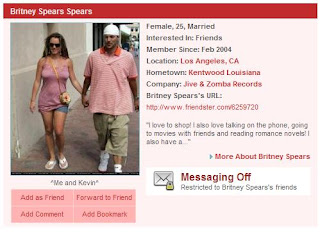
"But on the telephone line I am anyone, I am anything I want to be.
I could be a supermodel or Norman Mailer,
And you wouldn't know the difference.
On the telephone line, I am any height; I am any age I want to be.
I could be a caped crusader or space invader,
And you wouldn't know the difference, or would you?"
--Lyrics taken from Santa Monica (1997)
Written by Darren Hayes and Daniel Jones of Savage Garden

True enough, on the telephone, it is easy to assume any identity as long as your voice can pull it off. With the coming of the Internet, it has become even easier to be somebody you are not. Due to the anonymity of Internet users who are simply situated behind a computer screen, users can create a desirable image of him/herself on the Internet.
"One of the interesting things about the internet is the opportunity it offers people to present themselves in a variety of different ways. You can alter your style of being just slightly or indulge in wild experiments with your identity by changing your age, history, personality, physical appearance, [and] even your gender" (Suler, 2002).
Friendster - Personal Online Identity
An online identity that I own would be my online profile on Friendster (http://www.friendster.com/). Friendster, by now, needs little introduction as we all know that it is a popular online social networking site.

By viewing my profile page, you can find out a lot of personal data such as my name, age, location, school, zodiac sign, and how I look from my photographs. From the photographs, one can have a rough idea of where I usually hang out and how my close friends look like. Displaying of your last name is however, optional. Of course, there are users who choose to put up more/less detailed information about themselves. However, I have always set my profile as "limited to my friends only." This means that only those users whom I approve to be on my list can view my full profile. This is a method of
protecting your online identity on Friendster.
Friendster is constantly upgrading their system to maintain its popularity and now it allows its users to post their favourite videos in the "Media box" section where most prefer to conveniently embed videos from YouTube (
http://www.youtube.com/) into their Friendster profiles.
According to Joseph Walther's Social Information Processing Theory discussed by Em Griffin, people who are online have the opportunity to "make and sustain an overwhelmingly positive impression." They can present all their most attractive traits and accomplishments while filtering out the negative things. Thus, your online identity becomes a selective self-presentation (2006). So, if a stranger views your Friendster profile, he may develop a very different perception of you as compared to someone who already knows you personally.
Friendster - ReputationReputation is something that people tend to care a lot about. Of course, everyone wants to have a good reputation. It is the same for an online social networking site such as Friendster.
On Friendster, friends can leave testimonials and comments for one another which will appear on the profile page. The more positive and favorable testimonials/comments a person has may enable him/her to have a higher reputation in the "Friendster world." It also allows other viewers to get to know what others say about a particular someone. Here, we find an attribute discussed about the gift economy in my previous post: the testimonial section is highly fuelled by the principle of reciprocation.

To increase one's reputation, he might want to carefully select the information he chooses to present about himself to create a far more positive identity than he really possesses. As stressed in the introduction, on the Internet, you can be anyone or anything you want to be,
really. Therefore, be careful who you meet on Friendster. If you intend to meet him/her in person, remember that he/she might not turn out to be what you imagined him/her to be. Recall: the video posted on the COM 125 website (
http://com125.wordpress.com/2007/02/13/qotw5-online-identity-reputation-deception/).
Another way to judge a person’s popularity or reputation on Friendster is to take a look at his number of profile views. On the profile page, there is a section that states "Profile Viewed: XXX times since 1/2/2007."
In addition, people tend to judge a person's reputation by how many friends he/she has on his Friendster account. I have several friends who actually own multiple Friendster accounts because they seem to have just that many friends to add. Plus, there is no law/rule that states you can only add someone who is really your friend. It is a personal choice. These people usually name their multiple accounts by volumes such as: John Lee I, John Lee II, John Lee III etc. With the creation of multiple accounts, these users have now become
popular.
Identity Theft - The Attack of the Clones
With so much personal information easily found on someone's Friendster profile, it is extremely easy to steal his/her identity. On the Internet, "[m]any of the basic cues about personality and social role we are accustomed to in the physical world are absent" (Donath, 1996).
If someone wanted to steal my online Friendster identity, he could simply save and upload my photographs and replicate my personal information onto another user account. In addition, he could add the same friends I have on my original account since the list is easily accessible to him. From there, he could send messages, and much more, to my friends using my online identity.
If he is not discovered and dealt with, through computer-mediated communication (CMC), he could use increased flaming (hostile language that harms relationship on the Internet) in the messages sent to my friends while using my identity (Griffin, 2006). This would risk my relationship with my friends without my knowledge of it. "
How harmful are such impersonations depends upon how defamatory the faked postings are and whether readers believe the false attribution" (Donath, 1996).A true incident of identity theft on Friendster actually happened to my friend a few years back. Her profile details and photographs were duplicated onto another account and the "thief" added all of her friends on her original list and sent out a mass message telling them to delete her other account from their list, claiming that her original account was the fake account instead! When I received that message, I believed it and obediently deleted her real account from my list too. See the dangers of identity theft?
If you type "Britney Spears" or "Justin Timberlake" on Friendster's "User Search" function, you would be returned with hundreds of results, each containing photographs of these celebrities with a matching profile containing their name, age, occupation and hometown information accurately.

As celebrities, their personal data is easily accessible for anyone to replicate and assume the identity. However, it is less believable than assuming the identity of someone less famous, such as you and I. So, do not give out too much detailed information about yourself as you’ll never know if
someone might become another you.
References:Donath, J. (1996). Identity and Deception in the Virtual Community. Retrieved February 20, 2007, from
http://smg.media.mit.edu/people/Judith/Identity/IdentityDeception.htmlGriffin, E. (2006). Social information processing theory of Joseph Walther. A first look at communication theory, 6th edition, pp. 142-155. McGraw-Hill Companies.
Suler, J. (2002). Identity Management in Cyberspace. Journal of Applied Psychoanalytic Studies, 4, 455-460. Retrieved February 21, 2007, from
http://www.rider.edu/~suler/psycyber/identitymanage.htmlLabels: Assignments










 (www.deviantart.com)
(www.deviantart.com)


